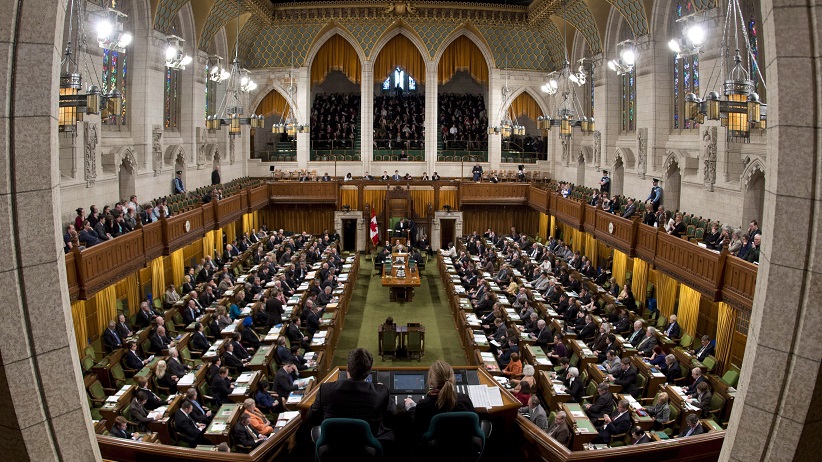Must-see QP: When a minister borrowed a lobbyist’s talking points
Your daily dose of political theatre
Share

Maclean’s is your home for the daily political theatre that is Question Period. If you’ve never watched, check out our primer. Today, QP runs from 2:15 p.m. until just past 3. We livestream and liveblog all the action.
The must-see moment
It’s a good day for any lobbyist whose opinion is immortalized in Hansard. Today, the lucky people at the Canadian Renewable Fuels Association, the voice of the ethanol and biodiesel industry, get to pat themselves on the back after no less than a cabinet minister gave their president a shout-out in the House of Commons. Megan Leslie, the NDP’s deputy leader, made it all possible by asking when the Conservative government would regulate emissions for oil and gas producers. Her question’s preamble recalled the fall report of Julie Gelfand, Canada’s Commissioner of the Environment and Sustainable Development. Gelfand concluded in her report, released yesterday, that the government wouldn’t meet its emissions reductions targets.
Aglukkaq didn’t have much to say about emissions regulations. She rarely does. The minister’s months-old claims about government action on climate change stand debunked. Her claims on emissions reductions are dead wrong. Instead of repeating those claims, again, Aglukkaq criticized Gelfand’s report. To that end, she appealed to CRFA President Scott Thurlow. “He was very disappointed with the commissioner’s report because it omitted major information,” the minister told the Commons. Aglukkaq then read Thurlow’s opinion into the record: “The renewable fuels regulations introduced by this Conservative government have removed the equivalent of a million cars and trucks from our roads. They did so while promoting $3.5 billion of economic growth.” End response. For lobbyists, that right there is mission accomplished.
Let’s step back for a second. The government and the renewable fuels lobby aren’t conspiring to take over the world together. That’s not the problem.
1. The CRFA is by no means a branch plant of Conservative thinking. Thurlow served as a director of parliamentary affairs to a Liberal natural resources minister during Paul Martin’s administration. Deborah Elson, the CRFA’s vice-president membership, stakeholder relations and industry promotions, managed Martin’s PMO press office—and then worked for the Liberal opposition until February 2007. This is also the same organization led for a time by former PMO communications director Kory Teneckye, a Harper man who talked to parliamentarians often about the virtues of renewable fuels in the months after the Tories rose to power. Andrea Kent, formerly senior staff to several Tory ministers between 2007 an 2011, currently serves as the CRFA’s vice-president, communications. A mixed bag of partisanship.
2. Conservatives haven’t acceded to every CRFA demand. The lobby group has applauded the Tories before, and even did so during the campaign that elected Harper’s team, but Thurlow wasn’t happy when then-natural resources minister Joe Oliver shut down a biofuels subsidy program in 2013.
The problem is that a renewable fuels industry group can find its talking points in Hansard after an opposition politician asks the government why it won’t regulate a carbon-belching industry. Something seems inherently missing when question period is reduced to whatever clever lobbyists, no matter their perspective, want to hear. Maybe it’s inevitable in Ottawa’s halls of power. But it takes a special kind of lazy minister to borrow someone else’s canned lines because her own no longer fool anybody.
The recap
The context
We were watching the elected occupants of the House of Commons tussle over how Canadians should contribute to the war in Iraq. That debate came to a conclusion, the coming deployment received the House’s blessing last night, and now all that’s left is the matter of the mission itself. Iraq, the subject of 2,137 parliamentary mentions in 2003 when the last American president invaded the country, is sure to preoccupy parliamentarians for some time to come. How long, nobody’s quite sure, because the current six-month mission may not be the end of Canadian engagement in the region.
The NDP remains unsatisfied, as Rogers Radio and CityTV Parliament Hill Bureau Chief Cormac MacSweeney reports:
There are, however, other things to talk about: just one example is the government’s refusal to, on the record, properly interpret graphs that track carbon emissions and then act accordingly. Aaron Wherry snarkily laments our collective inability to launch airstrikes against climate change. Meanwhile, Tom Mulcair and Stephen Harper might want to keep an eye above the chamber as they trade rhetoric this afternoon. The House in which they serve is crumbling.